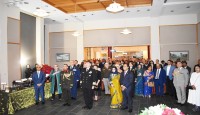Dr. Pamelia Riviere
The laws that enforce restrictions on eating and drinking in public spaces in Ramadan should be reevaluated and ultimately abolished. During Ramadan, the laws that enforce restrictions on eating and drinking in public spaces should be reevaluated and ultimately abolished. Religious freedom is a cornerstone of democracy and should not be enforced through coercive measures. Individuals should have the right to choose whether to fast or to partake in eating, drinking, or smoking outside of restaurants or workplaces without fear of reprisal. It is essential to recognize that not everyone can observe the fast. Many children, the elderly, and individuals with health issues—such as chronic illnesses or disabilities—may be unable to participate in fasting for various reasons.
Additionally, some people may have specific health needs that require regular nutrition or hydration. For those who smoke, the need to indulge during the day may also be a necessity. Furthermore, for people of other religions or cultural backgrounds who may not observe Ramadan, access to food and water during this holy month is just as important. Public policies should take into account the diverse needs of their communities and not impose a one-size-fits-all approach. Restricting access to open businesses and public spaces harms not only individual freedoms but also local economies. The expectation that restaurants must remain closed during daylight hours can be detrimental to their financial viability, especially in areas where tourism or local patronage is dependent on service availability.
Those who do choose to fast are generally understanding; they know that restaurants prepare iftar meals for the evening, and are aware of those around them who may not be observing the fast. Imposing strict regulations tends to escalate tensions rather than foster a spirit of mutual respect and understanding. Ultimately, exaggerating the role of religion in public policy can lead to harmful consequences, including societal divides and conflict. Rather than fostering a sense of community, strict and unnecessary restrictions can alienate individuals and undermine personal liberties. It is crucial that policymakers consider the implications of their decisions and strive to create an inclusive environment that respects the rights and needs of all citizens.
Smoking story at a tea stall of two young girls and harassment In the vibrant yet complex atmosphere of Ramadan, the visibility of women smoking in public spaces can ignite tension and backlash in certain third-world Muslim countries. A recent incident at a local tea stall involving two young women, who were harassed by an elderly man and a group of aggressive onlookers, has stirred significant discussion about contemporary societal norms and values. The trouble started when a 60-year-old resident reportedly asked two young women, who were in their twenties and seated on footpath chairs, to vacate the area. Yesterday, two women were taken into custody after they got into a confrontation with locals for smoking in a public space, according to police reports. Home Affairs Adviser Lt Gen (retd) Md Jahangir Alam Chowdhury has called on everyone to exercise patience during Ramadan and refrain from smoking in public areas. "As you know, smoking in public is not allowed for anyone, regardless of gender. It is an offense, and all should comply. I urge everyone to refrain from smoking outdoors," he stated to reporters.
Deputy Commissioner of the Tejgaon division of police, Md Ibne Mizan, mentioned that officers responded after learning about the altercation. He noted that the two female students faced harassment for smoking in that location. Police arrived at the scene, rescued the students, and took them to Mohammadpur Police Station. The elderly man then allegedly hurled insults at the young women. At one point during the verbal assault, it was reported that one of the women threw her tea at him. He then grabbed her by the hair and began hitting her, according to eyewitness accounts. Several men from the vicinity joined in by insulting the women. When a couple of bystanders attempted to assist, they were also allegedly attacked by the crowd.
The older man claimed to those present that the girls were using marijuana, although they denied it, insisting they were only smoking cigarettes. The police official stated that the issue was eventually settled after discussions with both parties, and the two students were returned to their families. This story reported in different media on March 02, 2025. Is it appropriate for women to smoke openly during Ramadan? In Ramadan, smoking women in public in a Muslim inhabited country can be problematic. This situation raises pressing questions: What drove the brazen and abusive behavior of the middle-aged man who instigated the crowd? And, alarmingly, why would he provoke a scenario likely to result in the girls being assaulted? From a broader global cultural lens, it becomes evident that women and children bear a profound social responsibility regarding their behavior—encompassing choices around attire, public presence, and even the timing of their outings.
This responsibility transcends borders and is not confined to less developed nations like Bangladesh, but is equally relevant to more advanced societies such as Canada. Women must navigate their environments with caution, as in numerous parts of the world, societal expectations severely restrict their freedom due to threats of harassment and eve-teasing. Strikingly, even in Canada, female students and workers often receive warnings to avoid university campuses, parks, and dimly lit areas after 9 PM. Nevertheless, many women, driven by necessity, find themselves commuting alone after midnight when the last public transit services run, vulnerable to incidents such as harassment from ride-share drivers.
The harsh reality is that assaults—including sexual assault—on university campuses are distressingly common even in Western contexts. It's critical to acknowledge that predators operate with little regard for surveillance cameras, penal systems, or law enforcement. Thus, it falls to parents and guardians to instill in their children a sense of the norms and values that can protect them in a world rife with danger. In a society that often turns a blind eye to the assault of women, a shift in attitude is not just desirable but essential. Men, in particular, must cultivate an understanding that they too have mothers, daughters, and sisters, and they should reflect on how they would feel if their cherished ones were to face violence or harassment. This profound sense of empathy is vital to fostering the societal changes necessary for creating a safer environment for all. Justice must never be wielded as a personal vendetta; those who choose to take the law into their own hands risk facing severe repercussions. Dr. Pamelia Riviere is a freelance writer and analyst



.jpg)



.jpeg)
.jpg)


